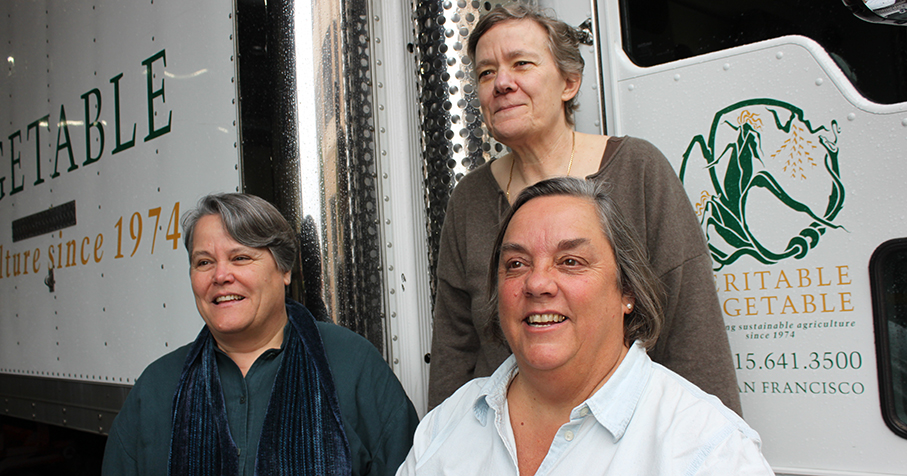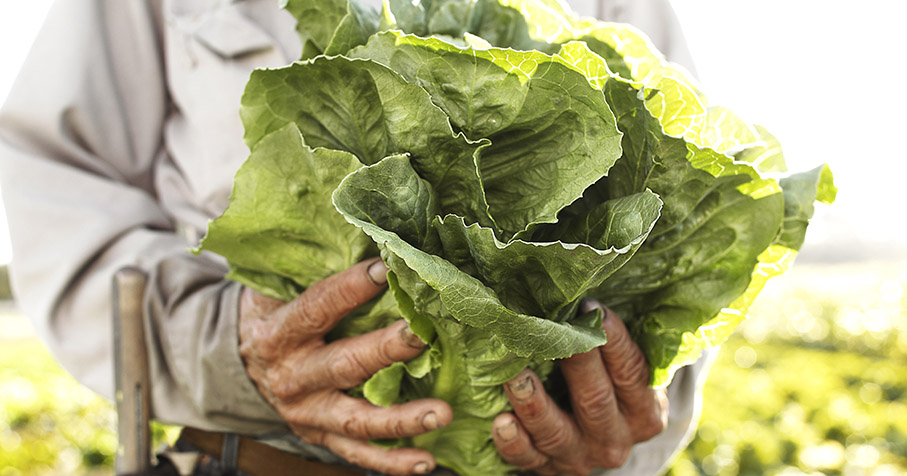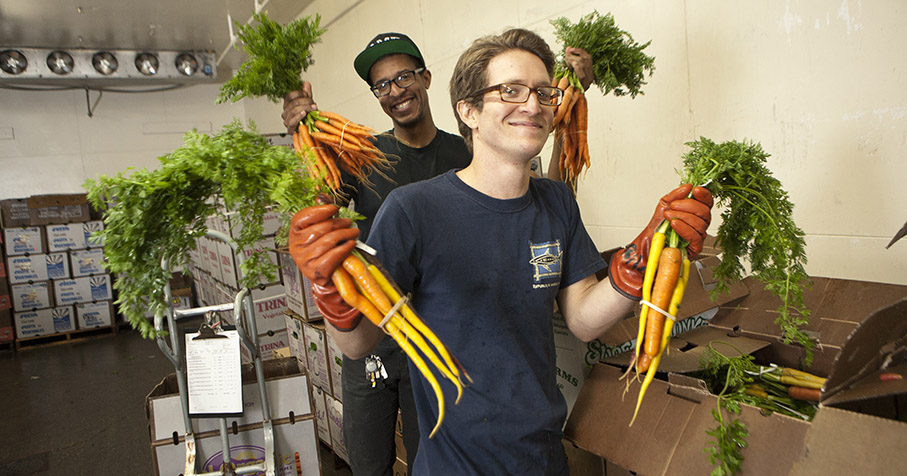Growing while staying true to radical roots
Nov 15 2016
When Veritable Vegetable, the oldest distributor of organic food in the U.S., was founded in 1974, San Francisco was abuzz with radical food movements.
There were Food Conspiracy buying clubs and the People’s Food System, which brought low-cost health food to co-ops and community stores. It was a heady time. The hitch: somebody had to transport all that organic produce from farms to shelves. Veritable Vegetable was created to fill that distribution role.
A successful company springing from idealism is a familiar story— except for one thing. As Veritable Vegetable grew into a $50 million enterprise with more than 130 employees distributing food to stores, co-ops, and restaurants across five states, it never abandoned its radical roots.
“Veritable Vegetable is like the holy grail of sustainable companies,” says Kate Danaher, RSF senior manager for social enterprise lending and integrated capital. “Even though they’ve been doing this for 40 years and are now well established, they’ve stuck to their mission and their values.”
Fierce belief in farm-to-table agriculture
Since 1978, three women have run the company: Mary Jane Evans, Karen Salinger, and Bu Nygrens. Evans began working there in 1976 as an employee (there were no titles in those days), while Nygrens and Salinger joined in 1978. They had not an ounce of business or food experience among them.
A fierce belief that sustainable agriculture could work guided the entrepreneurs. They took a values-based approach to every decision they made, from paying farmers fairly to treating every employee equitably (there was no pay differentiation among workers and no management structure) to creating environmentally responsible transport fleets and facilities.
“We definitely came to this with a social aim,” says Evans, who is now CEO. “We never thought, ‘Oh, we’re going into business to make money.’”
Build for growth, retain founding ethos

Veritable Vegetable owners (L to R) Mary Jane Evans, Karen Salinger, and Bu Nygrens.
On the path to becoming a thriving business, Veritable Vegetable hit a few roadblocks. For the first decade, the company had enough cash flow to stay afloat, and it experienced continuous growth. But by the late 1980s, says Evans, “there was a lot of disgruntlement.” Two issues were the amount of time staff spent to make decisions, and pay for experienced staff was similar to that of new staff.
To address the problem, Veritable Vegetable brought in a consultant, who reviewed the company and came back with startling news: employees wanted to know who was in charge. So the company put a management structure in place, with Evans, Salinger, and Nygrens at the helm. (“It was because we were the ones who always signed the contracts,” Evans jokes.) From that day forward, she says, “things got more effective and more efficient, and we started to show a small increase in profit.”
With the new organizational structure in place, Veritable Vegetable continued to embrace its values and grow, aided by the explosive growth in the organics industry itself. The company now picks up produce from 220 small to mid-size organic growers and delivers it to more than 500 outlets. They provide more than transport, keeping farmers abreast of market trends while providing customers with up-to-date information on what’s available, pricing trends, and other news.
The leaders’ ethos also permeates the company in other ways. Veritable Vegetable’s truck fleet is composed of 30 vehicles that are either electric-gas hybrids or run on diesel. Only one percent of the company’s waste goes into landfills. And Veritable Vegetable continues to maintain a 5:1 pay ratio between the highest-paid and entry-level workers.
Sharing social goals, speaking the language

Photo by David Mattheson Photography.
Veritable Vegetable’s growth, however, presented challenges along the way. The company owned a 23,000-square-foot building in San Francisco and leased 10,000 square feet across the street, plus another 6,000 square feet a block away. The company needed more space and to consolidate. Holding produce in different locations introduced breaks in the “cold chain,” threatening product quality. Tight space made it necessary to stack produce up high, which led to employee injuries.
Evans, Salinger, and Nygrens explored buying a larger building— preferably one with 80,000 square feet that they could share with another food business. For capital, they turned to RSF first. “We wanted a lender that spoke our language and had the same fundamental social goals we do,” says Evans. “And RSF is not as constrained in how it can finance as a traditional bank.”
The latter criterion turned out to be crucial. When Veritable Vegetable started hunting for a new space, the only suitable building they found in San Francisco had a value estimated at $25 million— more than double their budget. They regrouped, and decided instead to lease an additional 20,000 square feet in their building across the street.
But the new space needed upgrades, including $1 million for refrigeration and $3 million for improvements such as LED lighting, updated warehouse technology, and a reconfiguration of the space so it could accommodate more effective handling equipment.
Financing the upgrades would be difficult because Veritable Vegetable had no collateral, and it reinvests all of its money in the company. They didn’t have the $800,000 needed to secure the loan. “What was really special about what we did for Veritable Vegetable,” says RSF’s Danaher, “is that we came up with a down payment for them.”
RSF first matched a $100,000 U.S. Department of Agriculture grant that Veritable Vegetable received as a food hub, and brought private investors on board to provide subordinated unsecured loans, for a total down payment of $800,000. RSF then made a $1.6 million term loan to the company and worked with New Resource Bank to do the same.
A food hub model for underserved communities

Veritable Vegetable team members packaging carrots. Photo by Anne Hamersky.
Veritable Vegetable completed facility upgrades, including new truck docks, earlier this summer, and has moved most of its operations into the new building. The company now has an additional 20,000 feet of workspace, enabling it to operate more smoothly and decreasing breaks in the cold chain. And employees are safer because product is stored more effectively and they use ride-on equipment to lift pallets. The company plans to use the new site for another seven to ten years, during which time they’ll continue to improve operations.
Veritable Vegetable continues to pioneer. The company is a certified B Corporation, and they invest heavily in their community. For instance, they are working on a program to better serve smaller customers, many located in food deserts. They also mentor other food hubs, inviting organizations around the country to shadow their operations. “Our biggest tip for those starting out is to abide by the values that have guided Veritable Vegetable from the beginning,” says Evans. “Invest in relationships and pay the farmers fairly.”
Veritable Vegetable hopes to purchase a larger facility one day, with RSF’s help, and consolidate all of its operations under one roof. But for now, says Evans, “We feel like it’s a new day for us.”
This article was originally published in the fall RSF Quarterly.